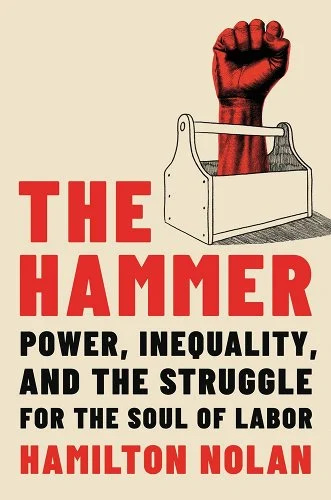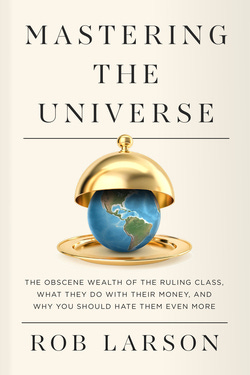It’s Labor Day weekend, the holiday established to honor the workers of America, and I’ve been spending time thinking about
’s proposal to eliminate the existence of billionaires.Nolan is a terrific, now independent, labor reporter and author of The Hammer: Power, Inequality, and the Struggle for the Soul of Labor, a book on how labor unions intersect with political power in different ways in different places.
Nolan is not saying that we should, you know…actually kill billionaires. Instead, he’s saying that we should “confiscate” any wealth accrued above 999 million dollars. After offering a handful of examples of the kind of lavish and wasteful spending that has become de rigueur for the ultra-wealthy, but nonetheless shocks the conscience, he offers the nut of his argument.
The United States government should confiscate the wealth of the very rich. Their wealth is symbolically grotesque, unnecessary for them to have, needed more by others, and, most importantly, allowing such wealth to pool into such a small number of hands warps our political system and our society at large in incredibly harmful ways. Rather than populist politicians grumbling about billionaires and railing at the way that they exert undue influence over all of our lives, the government should tax all individual wealth over, let’s say, $999 million at 100%. Democratic governments should not wage PR battles against billionaires. They should eradicate them.
As someone whose politics are far enough left to reach all the way to “social democratic,” I was surprised that my first reaction was: we can’t do that. My reaction was even more surprising given that I’d previously read Rob Larson’s Mastering the Universe: The Obscene Wealth of the Ruling Class, What They Do with Their Money, and Why You Should Hate Them Even More, one of the labor-related books I recommend in my Chicago Tribune column this week.
And yet, part of me, the part of me that is upper-middle-class and on the fortunate side of the present economic divide, balks. Is it right to constrain the freedom of others to get as rich as possible? What happens if we ban billionaires, and start sliding down the slippery slope until mere millionaires are in the crosshairs?
My qualms are both morally and practically ridiculous. Reining in the vanishingly small proportion of the population who are billionaires so they are merely rich beyond caring, rather than rich beyond caring many times over is not a slippery slope, and yet I think people of my generation and older (at least) have been conditioned to fear this kind of change.
I’m well convinced that wealth well under a billion dollars qualifies as obscene, and that this concentration of wealth has huge distorting effects on our politics and society. Elon Musk being able to buy and MAGA-ize a social media platform is one example. That weirdo Bill Ackman who managed to oust the president of Harvard on a bogus plagiarism scandal is another. The even weirder Peter Thiel who purchased a vice presidency slot for J.D. Vance (but is now having buyer’s remorse) is still another example. But there’s lots of smaller examples every day of people with significant wealth using that wealth to control the lives of others. Sometimes this is hidden or indirect. Other times it's quite direct, but in every case, we’re talking about infringements on the freedom of others.
This level of wealth, and the way it is amassed, not through labor, but via money making money, is structurally deforming. It makes it harder to those of us who are primarily paid through our labor to be properly paid for our labor, even as others become enormously wealthy.
And yet, because I’m better off than most, I still fear disrupting that system too much.
But if a billion dollars isn’t too much, what is?
This week, I’ve amassed a couple additional labor related stories that might be related to the above.
One comes to us from the University of Virginia, and a story of student laborers, the University of Virginia University Guides Service (UGS), a special organization that had been tasked with providing the campus tours of the university Grounds.1
You see, the UGS has run afoul of one U. Bertram Ellis Jr., a UVa alum, one of the appointees of Governor Glenn Youngkin to the Board of Visitors, and a large funder to the university who objects to the fact that the UGS shares the historically accurate information that Thomas Jefferson was a slaveholder and raped some of his enslaved people, in addition to being one of the country’s Founding Fathers and the founder of UVa.
Because Ellis objects, because he is politically connected to Virginia Governor Glen Youngkin (to whom he has donated generously for Youngkin’s campaigns), and because Ellis does not believe in principles of shared governance, the UGS will cease giving these tours, to instead be replaced by interns who will presumably stick to the script acceptable to Ellis.
While Ellis has used his political leverage achieved via large donations to Republican candidates to shape the operations of a public university closer to his desires, he simultaneously objects to the political activities of others, saying that the political donations of university faculty should be tracked because he and conservative allies on the board worry about students being “indoctrinated.”
Ellis isn’t even close to a billionaire - more like a hundred millionaire - and yet he’s able to bend an entire university, an ostensibly public university, to his will and infringe on the rights of others simply through the influence of that wealth.
Why should we let the ultrawealthy maintain all that wealth if they’re going to use it to subjugate the rest of us?
The second story isn’t directly about wealth, but more about how money and privilege intersect to create disfavored laborers that can be dismissed by those who work in closer proximity to wealth, and therefore maintain greater privilege.
Despite it being a model program for teaching undergraduate creative writing, Stanford University has decided to blow up the Jones Lecturers, “future firing” all of the existing non-tenure track faculty (some of whom have been at Stanford for 20 years), and replacing them with new, inexperienced instructors on one-year appointments (with the potential to be renewed up to five years).
If you’re interested in more background, there’s a news report by Ryan Quinn at Inside Higher Ed, as well as my more than two cents on how shorts-withed the decision is offered in my Just Visiting blog.
There’s a number of factors at work which underpin what’s happening, but at the crux of the matter, essentially, a handful of tenured Stanford creative writing faculty unilaterally decided to fire all of their non-tenured colleagues who outnumber the tenured by at least 3 to 1.
Now, as is the case for most universities, those Jones Lecturers teach the vast majority of the courses offered in creative writing, advancing the teaching mission of the institution while the tenured faculty sitting in their endowed chairs do…much less. But because the Jones Lecturers do not have tenure, they are offered no say in the governance of the department in which they are both a numerical majority, and do the overwhelming majority of the labor. (Jones Lecturers teach 90% of the course offerings in creative writing.)
The tenured faculty cannot be bothered to oversee a program that has grown past its original vision, and so rather than seize the opportunity, something which may require additional work on their parts, or display even a modicum of vision to set up the program as an ongoing quasi-independent entity, they’ve decided to blow it up.
I wish I could say that the disrespect towards their non-tenured colleagues surprises me, except that I’ve witnessed it first-hand at every place I’ve worked. This is not to say that every tenured professor is indifferent to non-tenured labor, far from it, but many are, and the way that higher education institutions are structured and governed has created a literal underclass of workers subject to the whims of those who have achieved a privilege which is not necessarily arbitrary, but by no means evenly applied.
I should stop before I get myself too heated up, because at some point I begin to take these things personally, having been burned in similar ways. My CV looks an awful lot like someone who’s in a tenured professorship, my ninth book on the way, dozens and dozens of published articles, stories, and interviews, many many invited talks, a recognized “thought leader” (barf, but still…) in both teaching writing and the intersection of writing and artificial intelligence, but when I was at Clemson, a half-attempt by some in the English department to secure a better position for me was shot down by a Dean because I was already working as an instructor. If I was worthy, I wouldn’t have found myself in such unfortunate circumstances to begin with.
At College of Charleston when I applied for a tenure-track position I, along with many others, was qualified for, after five years of demonstrating my ability and dedication to furthering the mission of the school, I was not even a finalist for the job. People I considered my colleagues looked at me and my work and said, “nope.” You see, there was only one tenure track job, a scarcity that is administrative, artificial, rooted in a perceived lack of resources.
But how can we lack resources. We are the richest country in the history of the world, at this moment richer than ever in our history, until tomorrow when we will be richer still. In aggregate there is no lack of resources, but we have to wait for those who hold the resources to share them with the rest of us. At least the Gilded Age robber barons built universities and libraries or mansions that could one day be repurposed into tourist attractions, rather than hundred million dollar penthouse apartments or underground lairs in Hawaii. (That’s Mark Zuckerberg.)
In the end, it’s worked out for me. I successfully pivoted to a different life that I would not trade to go back to being full-time in academia unless it was in a tenured Stanford-like gig where I got paid a ton of money to do very little other than what I was going to do anyway.
But over the course of my career, I saw dozens of people doing amazing, meaningful work teaching students be flushed out of the system through similar circumstances. Stanford is about to do exactly this en masse. The higher ed story is one of literally decades of indifference of those with privilege to make changes that extend those privileges to others who in every way but title are their equals, their colleagues, their fellow laborers.
I understand the impulse to protect one’s own privilege. I just confessed to it above in my qualms about eliminating billionaires because I’m worried about myself.
But those feelings shame me. At least I can still feel that.
Links
Fall book season when dozens of big titles are published virtually simultaneously starts earlier every year. Here’s a round-up of some anticipated titles from NPR. This is what the Associated Press is hyped for, if we can think of a wire service as being hyped about anything. The Nation has released its fall books issue. It’s awesome that a magazine is still doing a fall books issue.
Fall books season isn’t even here, and yet Elle is ready to tell us the best literary fiction of 2024.
Here’s a great reflection by Steve Paul on Evan S. Connell, one of the “quiet giants” of American literature.
The finalists for the 2024 Kirkus Prize have been announced. I was particularly psyched to see Rufi Thorpe’s Margo’s Got Money Trouble in the list. It has not been disadvantaged by its cover from being seen as prize-worthy.
Via
and thanks to Dan Capera, “They Say Write What You Know, Which Is Why I Only Write About Failed Relationships with Women Who Look Like My Mother.”Recommendations
1. Oh, William! by Elizabeth Strout
2. The Talented Mr. Ripley by Elizabeth Highsmith
3. The Education Wars: A Citizen’s Guide and Defense Manual by Jack Schneider and Jennifer Berkshire
4. Ways of Seeing by John Berger
5. Help Wanted by Adelle Waldman
Lisa P. - Austin, TX
It’s been awhile since I recommended one of my favorites since I started doing the newsletter. The gentle, but still perceptive and moving Search by Michelle Huneven.2
I thought the recommendation queue looked full, but everything is for people who are looking to be in the Tribe column, rather than newsletter folks, so act now and waits may be short.
Sorry if that all came across as a little self-pitying. I’m really over it, except when I think about why what happened happened, and how it’s still happening to others. I wonder why we can’t get our shit together at least a little bit, but then I remember I’m as troubled as anyone on following through on my own convictions.
Have a good extended holiday weekend to all who observe.
JW
The Biblioracle
The UVA campus grounds are so special they capitalize Grounds.
All books (with the occasional exception) linked throughout the newsletter go to The Biblioracle Recommends bookstore at Bookshop.org. Affiliate proceeds, plus a personal matching donation of my own, go to Chicago’s Open Books and an additional reading/writing/literacy nonprofit to be determined. Affiliate income for this year is $87.30.






I agree with your sentiment that we don't need billionaires and should tax their excess wealth. However, I am concerned with how this could actually be done well. I've yet to hear a good plan. No one seems to consider 2nd and 3rd order affects. You do in part with your concern about the threshold being lowered over time. Also, taxing wealth is very different from taxing income or purchases. As so much wealth is bound up in stocks and bonds, it changes daily in often arbitrary ways. I am concerned that everyday people with substantial retirement accounts they've spent their whole lives building may be (eventually) pulled into this in a way that damages them. But then, I also recognize (like you) that this may be my privilege talking. In any case, it is an idea worth considering and exploring how it might be implemented.
So very true and cuts right to the chase. Also, brillliantly written!